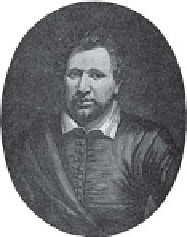Information Technology Reference
In-Depth Information
FIGURE 4.3
Suppose both Ben Jonson and William Shakespeare simultaneously write down
Hamlet
. Who owns it?
(Ben Jonson, Walker Art Library/Alamy; Shakespeare, Classic Image/Alamy)
A second paradox has to do with the copying of intellectual property. Consider a
slightly different version of our story.
SCENARIO B
One evening William Shakespeare stays up all night in a pub writing
Hamlet
while Ben Jonson goes to a party. The next morning Shakespeare returns to the
Globe Theatre, but he carelessly leaves a copy of
Hamlet
in the pub. Jonson stops
by for a pint, sees the manuscript, transcribes it, and walks out the door with a
copy of the play in his possession, leaving the original copy where it was.
Did Jonson steal
Hamlet
? Shakespeare still has his physical copy of the play, but he
has lost exclusive control over who will read, perform, or hear the play. If you want to
call this stealing, then stealing in the sense of intellectual property is quite different from
stealing a physical object. When you steal someone's car, they can't drive it anymore.
When you steal someone's joke, both of you can tell it.
Certainly any creator of a piece of intellectual property has the right to keep his
ideas a secret. After Shakespeare wrote
Hamlet
, he could have locked it in a trunk
to prevent others from seeing it. Ben Jonson would not have had the right to break
into Shakespeare's trunk to get access to the play. Hence we can argue that there is a
natural right to keep an idea confidential. Unfortunately, this is a weak right, because
Shakespeare cannot perform the play while he is keeping it confidential. He must give
up the confidentiality in order to put his creation to good use.
We began this section with the follwing question: Is there a natural right to intel-
lectual property? We have found no right other than the weak right to keep an idea
confidential. In our quest for stronger rights, we have uncovered two important dif-
ferences between tangible property and intellectual property. First, every intellectual
property is one-of-a-kind. Second, copying a piece of intellectual property is different
from stealing a physical object.




